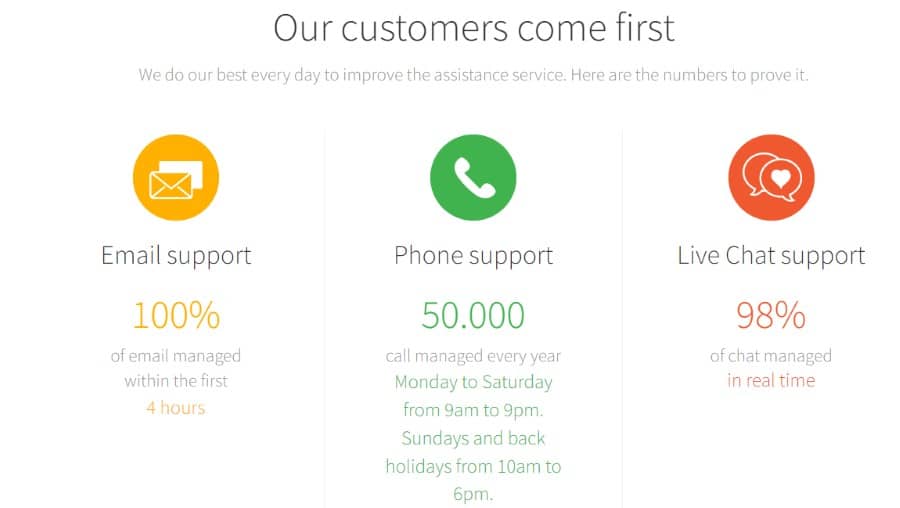Just last week, my colleague used the word “spitball”.
As I sat there, disgusted at the picture of us doing heaven knows what to a ball, it dawned on me: he must mean something else!
To save you the unsavory mental images and improve your writing skills, we’ve compiled a list of common buzzwords with their meanings, plus alternatives for each.
Let’s get stuck in.

What Is a Buzzword?
A buzzword is a popular word or phrase that people use to describe a concept, idea, or trend that is in vogue.
They’re often used in marketing campaigns, social media, customer service, advertising, and more to make something seem exciting or new.
31 Trending Corporate Buzzwords That’ll Have You Grinning Like a Possum
From industry jargon to tech slang, these marketing buzzwords are frequently used in conversations, presentations, and even job interviews.
1. Synergy

Synergy is simply the sum of the efforts that exceed those of the individual.
Here’s an example of how it’s used:
The synergy between the sales and marketing departments resulted in a 30% increase in revenue.
Another classic way to say it is “the whole is greater than the sum of its parts”.
2. Deep Dive
You might find this buzzword during a brainstorming session when someone wants to do a thorough analysis of an idea or issue.
For example:
Let’s take a deep dive into how web browsers work.
You could instead say have an “in-depth discussion” or do a “thorough analysis”.
3. Low Hanging Fruit
This common buzzword usually refers to taking the easy wins before tackling the ones that require more time or effort.
Such as:
Our team decided to focus on the low-hanging fruit first, by targeting customers who had already shown interest in our product.
Other alternatives that mean the same are “easy pickings” or “easy wins”.
4. Think Outside the Box
This buzzword has been around for decades and has become a staple in corporate jargon. It’s all about breaking free from the norm and finding fresh, innovative solutions.
For instance, you might say:
Let’s think outside the box and come up with something unexpected.
A simpler way to express this would be, “Let’s get creative and think of something new.”
5. Content is King
Coined by Bill Gates, “content is king” simply means to succeed, it’s important to publish engaging, high-quality content.
For example, a content marketer might say:
We need to prioritize creating informative blog posts, content is king.
Another way to say it would be “great content drives success”.
6. Ping
Bizarrely, “ping” doesn’t come from the sound of a message hitting your inbox but from a technical term meaning to check the status of another computer.
Nowadays, it’s come to mean “let me know through digital messaging”.
For example:
Ping me when you’re ready.
A universal way to say it would be, “Send me a message when you’re ready”.
7. Thought Leader
“Thought leader” is a buzzword used to describe someone who is considered an expert in their industry and has innovative, insightful ideas.
Consider:
She’s a thought leader in the marketing space and always has fresh insights.
A simpler way to express this would be, “She’s an industry expert who offers unique and influential ideas.”
8. Metaverse

“Metaverse,” a product of artificial intelligence (AI — another buzzword), is used to describe a virtual shared space created by the convergence of physical and virtual reality.
Let’s take a look at an example:
Mark Zuckerberg has set out to pioneer the creation of an immersive metaverse.
A simpler way to express this is to describe it like it is, “a virtual world where the physical and digital merge.”
9. Move the Needle
An action that “moves the needle” has a significant impact on the outcome.
It’s a popular term because it encourages you to focus on what really matters.
For example:
To get a new job, crafting an impressive resumé will move the needle.
You can express it without the jargon by saying “have a high impact” or “making a difference”.
10. Circle Back
One of the least liked buzzwords of our time, “circle back” means to revisit a point.
Some people find it insincere because it can be used to delay or avoid addressing an issue directly.
For instance:
Let’s circle back to your point in a separate meeting.
An alternative is to say, “Follow it up later” or “Return to the topic at a later time”.
11. Take this Offline
“Take this offline” is a buzzword used in business conversations to suggest moving the discussion away from the current meeting or public forum.
Such as:
We better take this discussion offline.
You could express the same idea by saying, “Let’s discuss this further in a private conversation outside this meeting.”
12. New Normal

We’ve all heard this enough times! Coined during the COVID-19 pandemic to describe the shift towards a new way of life, it’s nobody’s favorite buzzword!
For example:
Working remotely has become the new normal for many companies.
Instead, you can say, “The way things are done has changed due to the pandemic” or “We’re adjusting to a new way of living”.
13. Zoom (as a Verb)
“To Zoom” has replaced “to Skype” and has become a popular buzzword for virtual meetings. It can also be used as a verb meaning or to participate in a virtual meeting.
Such as:
Let’s zoom at 2 pm to discuss the project.
To avoid jargon, you can also say, “Let’s have a video conference.”
14. Alignment
“Alignment”, as a buzzword, describes bringing people or teams together to work towards a common goal.
For instance:
We need to get everyone in alignment on our project timeline.
An alternative way to express it would be “to be on the same page” or “working towards the same goal”.
15. Value Add

“Value add” describes a service or product that offers an additional benefit beyond its basic function.
For example:
Our company offers value add services such as 24/7 customer service.
Offering more services as part of a product isn’t new. There are many ways to express it, like “our company offers extra benefits” or “unique advantages”.
16. Bandwidth
“Bandwidth” is a newly acquired business term that came from radio waves and now means someone’s work capacity at a given time point.
As an example:
What’s your bandwidth this month?
Meaning, “What’s your capacity to take on work this month?”
It’s a useful term, but if you prefer plain speak, you can ask, “How much work can you take on?” instead.
17. Customer Journey
The customer journey is the path a person follows from the moment they discover your product to the moment they become a customer.
Here’s an example:
Our team is working to improve the customer journey by identifying pain points.
There aren’t many ways to describe this term without being long-winded, so it’s a useful new expression.
However, one alternative could be “customer experience”.
18. Big Data

Big data is a new term that refers to computers that can process large, complex data sets. It just means lots of data that a human can’t analyze without special software.
For instance:
97.2% of organizations are investing in big data and AI.
Saying “large amounts of data” is also fine.
19. Growth Hacking
Growth hacking is like life hacking, but it means “tricks” or low-cost strategies to grow a business. It’s a rebellious little “beat the system” manifesto.
For example:
Dropbox is a company known for its creative growth hacks
If you want to keep it simple, you can say “low-cost growth strategies” or “budget ideas for growth”.
20. Incentivize
Is it even a word?!
Officially, yes.
According to the Oxford Dictionary, it means “to encourage someone to behave in a particular way by offering them a reward.”
Here’s an example:
You need to incentivize your customers so they remain loyal to your brand.
But you can also just say “reward” or “encourage” and skip the buzzword altogether.
21. Smarketing
Smarketing combines the words “sales” and “marketing”.
In plain speak, it means a client acquisition strategy that integrates sales and marketing in synergy (buzzword alert!).
For example:
Incorporating smarketing into will enable you to get the best out of both departments.
Prefer to use plain English? Try “integrated sales and marketing strategy.”
22. Hyperlocal

Hyperlocal is exactly what it says on the label — something relevant in a small community or small local area.
For instance:
Google Maps offers a hyperlocal search when you look for a restaurant near you.
Just saying “local” also covers it, but you can specify where or in which group to further define the area.
23. Retargeting
Retargeting is actually a real word that existed before the internet.
Nowadays, it’s used in digital marketing to focus ads on potential customers who have visited your website and left.
For example:
Cookies inform retargeting platforms that they should send specific ads to your browser.
Some alternative expressions are “refocusing” or “targeting site visitors”.
24. Freemium
You know, when you sign up for a free account to get you hooked but only get the good stuff with the paid version?
Well, that’s a freemium.
It’s a play-on-words of “free” and “premium.” Such as:
Have you tried our freemium product?
So, what are your options if you want to sound like you’re human and not AI?
Simply say “free version of a premium product” or “free version”.
25. Weasel Words

This is a great buzzword because of the imagery it presents.
Being a weasel — trying to avoid giving a straight answer — is generally frowned upon. Weasel words are the kind of words a weasel would use.
For example:
“Research shows…”
… and not referencing the source.
To ensure your audience understands you, call it “evasive language” or “doublespeak”.
26. Holistic Approach
This one’s been on the market for some time, especially in the wellness sector. It means looking at a situation as a whole to decide the best course of action.
For example:
Our company’s holistic approach means we don’t just focus on closing deals, but also on building long-term relationships with our clients.
Another way to say it is to “approach something from a wider perspective”.
27. Boots on the Ground
“Boots on the ground” comes from army-speak, but as a business buzzword it means employees physically in contact with customers.
For instance:
We need to get our boots on the ground and visit our customers in person.
If you prefer to sound like a civilian, you can say “directly interact with customers” or “meet in person”.
28. Digital Transformation
Digital transformation is an entire buzzword category in and of itself.
It symbolizes the adoption and integration of digital technology into all facets of business.
For example:
Our company experienced a digital transformation during the Covid pandemic. The online revenue increased by 200%, while our in-person sales plummeted.
You could also say the alignment of tech, content marketing, social media, email marketing, and more.
29. Give 110%
Ah, the classic buzzword “give 110%” — or pushing yourself to go above and beyond what’s expected to achieve success.
As Don Zimmer said:
What you lack in talent, can be made up with desire, hustle and giving 110% all the time.
In simpler terms, it means to work really hard. But where’s the fun in saying that?
30. Paradigm Shift
The term “paradigm shift” is used in many circles.
Essentially, it means a fundamental change in how things work or are perceived.
For example:
The rise of online shopping has caused a paradigm shift in the retail world.
It just means things have been turned upside down. So, instead, you could say, “flipped it on its head.”
31. Reinvent the Wheel
A classic buzzword that means to create something new when there’s already a good solution out there.
Such as:
We don’t need to reinvent the wheel with this campaign.
In other words, don’t fix it if it ain’t broken!
Master Business Buzzwords to Elevate Your Communication
Knowing the latest buzzwords is crucial in the ever-changing landscape of the business world.
But don’t overuse them, or they’ll end up losing their meaning.
So, start incorporating these buzzwords into your vocabulary today to enhance your writing, and you’ll be grinning like a possum in no time!




